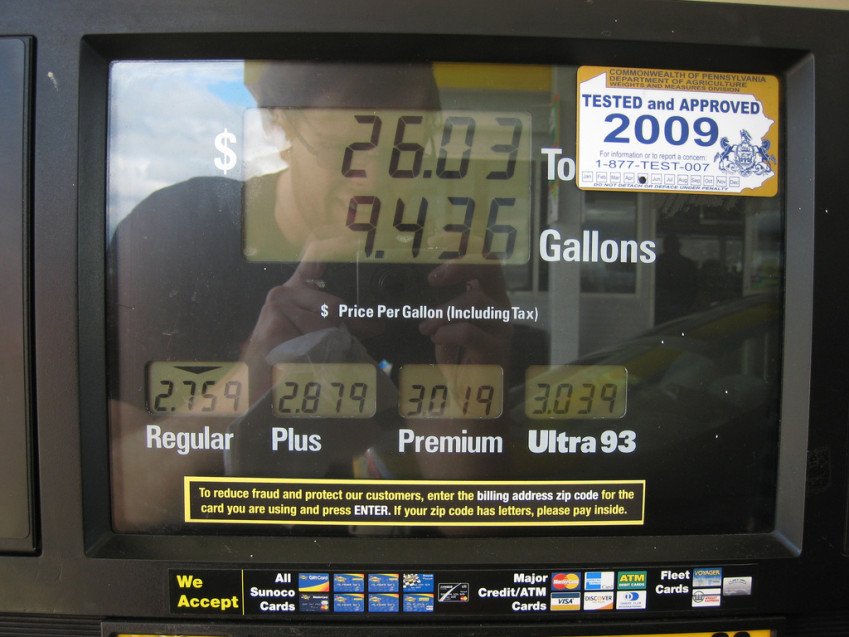
Big city-dwellers notwithstanding, American consumers may purchase gasoline more frequently than any other item. In fact, according to a 2009 Nilson report, when it comes to credit card purchases, gas is the most frequent purchase. Food, groceries and retail items are also on the list, but when you think about it, it makes sense — most Americans pump their own gas on a very regular basis.
For many people the price of gas relates directly to their work. Taxi drivers, truck drivers, and the millions who commute by car are directly impacted by fluctuations in the cost of gasoline. For these reasons and many others, we as well as many people in other developed countries are hyper-sensitive to gasoline’s price. It is also difficult to think of almost any business, anywhere in the world, whose bottom line is not affected by the price of a fossil-fuel based energy. In other words, if you move anything other than paper the price of gasoline is probably important to you.
Hence, the stir caused by Republican presidential candidate, and recent winner of the Iowa Straw Poll, Michele Bachmann. She asserted that, if elected, she will fight to bring us back to the heady days of $2 per gallon gasoline. It’s one hell of a campaign promise.
Ever since that promise was made, we’ve heard a few folks say that it can be done, and many more folks say that it absolutely can’t be done. Meanwhile, at least one well-televised observer has said that Bachmann is “flat out nuts” for making the claim at all.
For the moment at least, let’s get past the debate about whether it can, or can’t, be done (frankly, I am in the “it can’t” camp) or the sanity, or lack thereof, of the campaigner. Instead, let’s talk about what the price of gasoline should be — not in some moral or utopian sense, but rather in terms of pure and simple economics.
Gas 101: the price at the pump is related to the price of oil. The nature of the relationship, however, is more complicated.
Ever notice that the price of gasoline doesn’t seem to decline in perfect tandem with the price of oil, but does seem to increase, on tempo or even faster when the price of oil heads north?
That said, complaining about the price of gasoline is tantamount to complaining about the price of oil. Just this week, I’ve heard or read about at least a half-dozen explanations as to why the price of oil is so high. They include: excessive speculation on Wall Street; the elaborate mystery of OPEC price manipulation; the excessive profits of the multinational oil companies; the heavy taxes on big oil; and, of course, too much or too little government regulation — take your pick.
Just last week, I was discussing the subject of this column with a friend at our local coffee shop. During the course of that conversation, I consumed a bagel, a 16 oz. latte and a 16 oz. bottle of water. While we ate and discussed affairs of state, I put pencil to paper. A recent price of a barrel of oil was $84. A barrel contains 42 gallons. A gallon contains 128 ounces. Therefore, a 16 ounce cup of oil, however unpalatable it may be to drink, would cost me a quarter. I paid $1.25 for the water, and $3.95 for the latte. I’m not a geologist, but I’ll bet you that this earth has a great deal more water and coffee than it has oil — and while I was at the coffee shop, it started to rain.
Not a fair comparison, you say? You’re probably right, so let’s try some others. How about that old standby, the consumer price index? The CPI-U, which is the broadest-base index published by the Bureau of Labor Statistics and includes price comparisons for more volatile commodities like gasoline (no pun intended, I think) was set at 100 in 1982-1984. As of July 2011 it stands at just a shade under 226. This means that, very theoretically, something for which you paid one dollar in 1983 will cost you $2.26 today. The national average price for a gallon of regular gas was about $1.25 in the base years, and right now is about $3.57. This would yield a multiplier of about 274 as opposed to the current CPI of 226. It’s higher, but not all that much higher. Moreover, as our intrepid wannabe President pointed out, as recently as late 2008 the national average price per gallon was (momentarily) around $1.80, indicating a multiplier of only about 150. By contrast, tuition at my alma mater, Stanford University, which was $7,140 in 1982, is now around $40,050. Do the math. That’s a CPI of 560. What I’m getting at here is that as hard as it may be for many of us to accept, gas in the United States simply isn’t that expensive.
At the end of the day, I don’t know what oil prices should be, but I do know that they will be at least as much affected by politics as economics. Maybe you think that this isn’t a terrible thing since almost certainly the political influences under our control are always working to keep prices low. One measure of the power of the United States is that prices here are relatively reasonable compared to prices in many European countries, where gas costs as much as $10 a gallon. But if there is a lesson to be learned from the economic trauma American families have suffered since the beginning of 2008, it is that true economic forces win in the end. No matter how easy money became, nothing could stop the housing crash. Given the fact, however it’s extracted, there is only a finite amount of fossil fuel we can exploit, the best way to reduce your cost of gas is to use less of it. From the standpoint of pure economics, it seems much more likely that a gallon of gas in the U.S. will cost six or seven dollars, not two.
You see, in a free market economy, prices are presumably set by supply and demand. Although many steps have been taken in the US to limit the demand for gasoline — smaller and more fuel-efficient cars, alternative sources of energy like natural gas, and gasoline “stretchers” like ethanol — they haven’t really succeeded. And, of course, demand in formerly less-developed countries like China and India is exploding. The prospects for an increase in supply as an offset to higher prices are also not very rosy. All of the King’s horses and all the King’s men simply can’t do enough offshore drilling to make a real difference. Alaska isn’t Saudi Arabia, and all of the exotic sources you’ve heard of, like shale oil and oil sand, are simply not economically viable at today’s prices. Oil is actually too cheap to justify the work needed to bring it to market. In other words, unless the price of oil increases — substantially — you won’t be putting anything that comes from shale or sand in your tank. Seems paradoxical, doesn’t it?
But the ultimate truth is that whatever you think about oil prices, the premise of the last paragraph is misleading; that is, whatever is moving the price of oil, it’s not just good old supply and demand. The price of oil is the single most globally political number that exists. OPEC is a classic oligarchy and has a very simple and well defined interest; if you can’t think of what it is just consider what the GDP of Middle Eastern countries would be without oil exports. On the other hand the “OPIC” (the Obvious Petroleum Importing Countries) are hardly without the resources to strong-arm prices when the need arises. Additionally, in the United States at least, government regulation relating to environmental, safety, and revenue concerns is significant and certainly has an impact not only on the supply of oil, but also on the cost of getting it out of the ground. And finally, campaign promises wouldn’t be made about the price of oil if it weren’t important in the upcoming elections. In fact, the price of oil has been important in American politics for quite a while now, certainly since the shortages of the mid-70s.
But, again, I think economics will always ultimately trump politics (the laws of economics don’t change, but positions taken by politicians often do). However, perhaps broader and more effective political steps can be taken to help change economic conditions. For example, an all-out effort to replace fossil fuels will probably pay off in the long run, although how the political will to accomplish this can be mustered is anybody’s guess. Then, there is the Soprano solution, suggested by a different kind of Trump: simply invade certain Middle Eastern countries and take the oil… That would get the price down once we made the initial investment of a few trillion dollars to finance a war or two. Oh yeah, we did that already. It hasn’t worked so well.
Although, I hear Tripoli is quite beautiful in the autumn.










